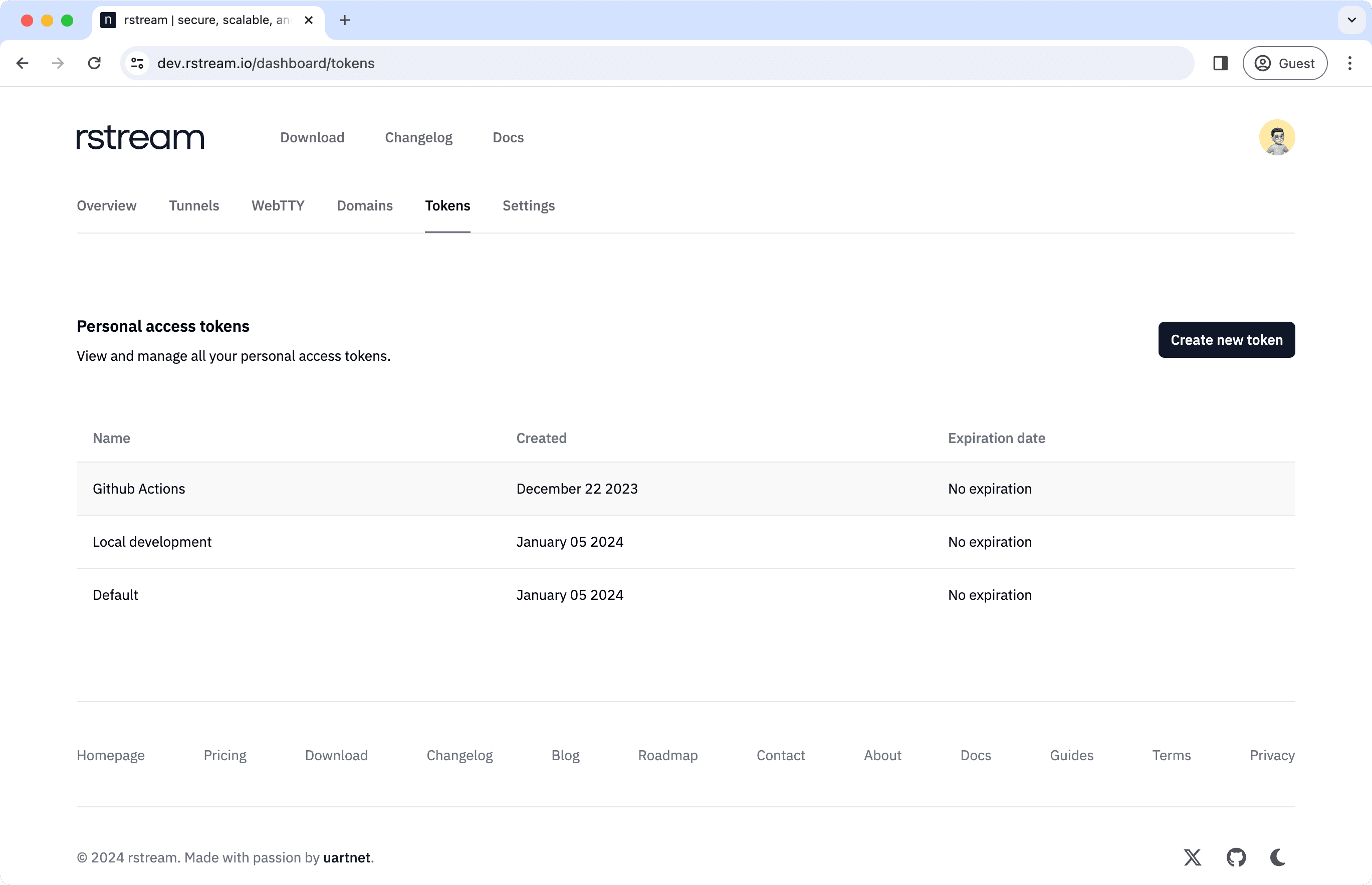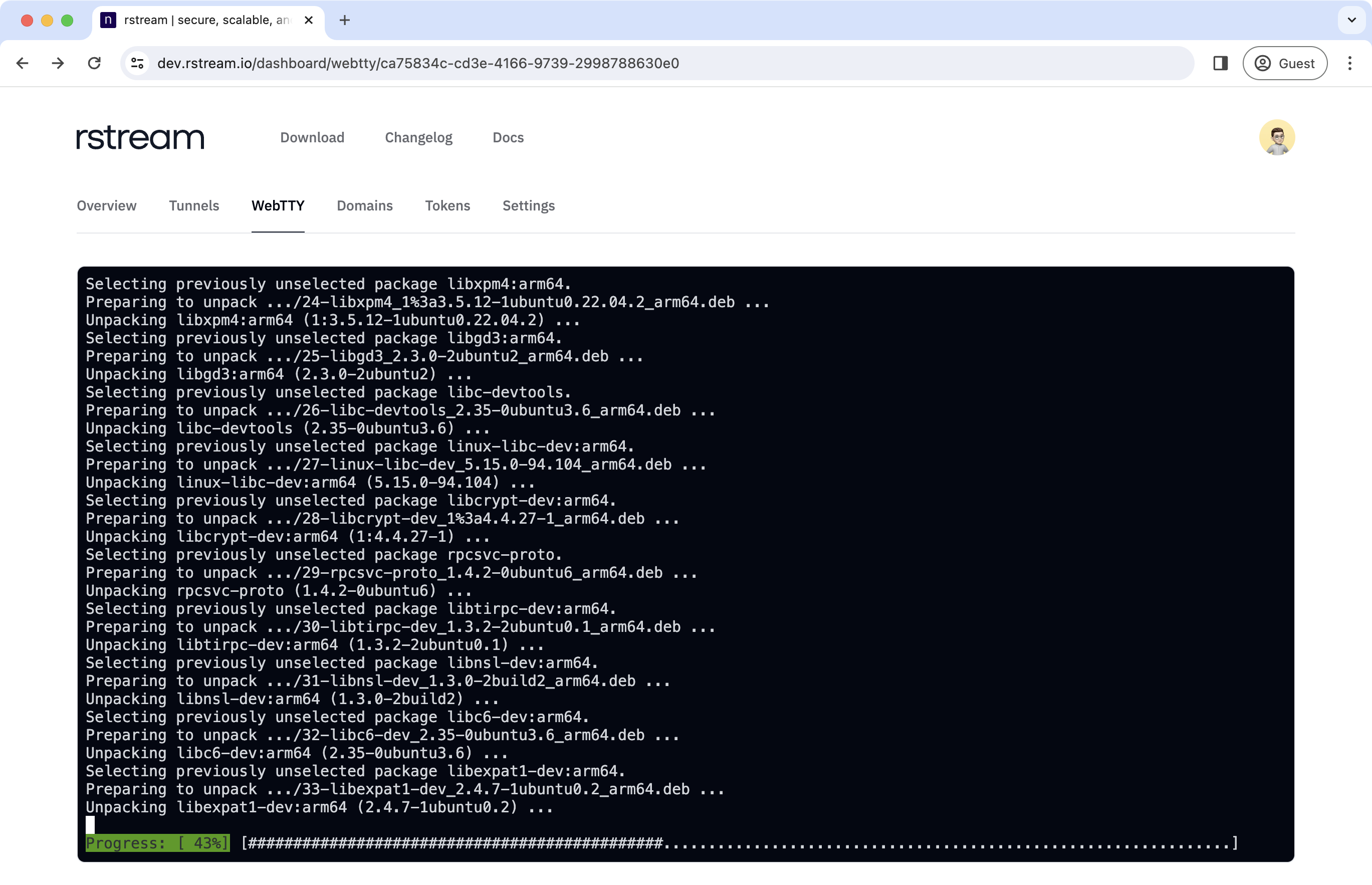Powerful Tunnels for Modern Applications
rstream enables secure, scalable tunneling from localhost to the global network, simplifying remote access and infrastructure management.
Features
Transform localhost into global reach through secure tunneling

- Private / Public Tunnels
- Secure and scalable, rstream's Private / Public Tunnels connect local to global via TLS/HTTPS. Ensuring seamless and fortified remote access, it's the bridge for secure data paths.
- TLS Encryption
- Utilize TLS encryption for all communications, ensuring your data remains secure and private. rstream enforces top-tier security protocols, safeguarding your information from unauthorized access.
- Token-Based Authentication
- rstream enhances security with Token-Based Authentication, offering fine-grained control over access permissions. Determine who connects and to which resources, ensuring each tunnel is authenticated and authorized for utmost security.
- Platform Agnostic
- rstream is built for true cross-platform support, operating effortlessly on Linux, macOS, Windows, and beyond. From embedded systems to large-scale servers, enjoy consistent performance and secure tunnels across all your devices.
- Operational Monitoring
- Gain valuable insights with rstream's Operational Monitoring, providing real-time metrics and usage statistics to oversee your network's performance. Monitor the health and efficiency of your tunnels, optimizing for reliability and speed.
- Comprehensive Documentation
- Dive into our detailed documentation, designed to streamline your rstream adoption and usage. Whether you are a beginner or an expert, our guides cover everything you need to know to deploy and manage your secure tunnels efficiently.
rstream is developed with an open roadmap initiative, inviting you to explore our roadmap.
Get Started
You're three easy steps away from secure networking
- Install rstream CLI
- Install the rstream CLI on devices to start exposing resources with secure, streamlined integration.
- Add your Authentication Token
- Secure each device with an authentication token for enhanced identity verification and managed permissions.
- Create and Expose Tunnels
- Establish multiple tunnels on devices, directing rstream's edge network traffic to targeted resources effectively.
rstream is compatible with Linux, macOS and Windows. Get rstream now.
Use Cases
Explore rstream's use cases
- Local Development
- With rstream, transition from localhost to globally reachable setups effortlessly, simplifying development workflows and deployment processes.
- Network Protection
- rstream boosts network security by managing access, preventing DDoS, hiding IPs, and encapsulating legacy protocols within a secure environment.
- Fleet Management
- rstream enhances fleet management by controlling resource access and acting as a signaling layer through its API, enabling advanced middleware solutions.
- Generative AI Solutions
- Utilize rstream for generative AI, distributing workloads across GPU instances and authenticating users for secure, scalable AI deployments.
- Real-Time Communications
- Enable low-latency streaming and real-time communications. Ideal for telemetry, metrics, and video streaming, ensuring swift data transfer and immediate response.

Utilize rstream to craft your unique solutions, focusing on application development while relying on our infrastructure for rapid, secure deployment.
How it Works
Inside look at rstream's architecture
Clients
Devices
rstream expose 8080
forwarding : https://e771e53b.rstream.ioforwarded : http://localhost:8080
waiting for connections...myserver --bind 127.0.0.1:8080
serving HTTP on 127.0.0.1 port 8080 (http://127.0.0.1:8080/)...rstream provides a cutting-edge infrastructure-as-a-service solution, allowing you to deploy applications globally without needing a public IP address, using only outbound connections. It works on any network, protects your devices from direct attacks, and enables you to authenticate and monitor traffic securely.
rstream SDK
Integrate rstream's edge network into your applications
- Direct Access
- Integrate directly with rstream's edge network for global reach using only outbound connections, simplifying global application availability without complex configurations.
- High Performance
- Leverage asynchronous programming in modern C++ with boost asio for superior control and performance, ideal for high-demand applications requiring simultaneous communications.
- Enhanced Security
- Elevate application security effortlessly with the rstream SDK, implementing rstream's comprehensive security features with just a few lines of code.
- Easy Integration
- The rstream SDK's portability across all major operating systems and architectures, along with extensive documentation, simplifies turning existing applications into rstream-ready solutions.
#include <cstdlib>
#include <iostream>
#include <boost/asio.hpp>
#include <boost/beast.hpp>
#include <rstream/rstream.hpp>
namespace rstrm = rstream::io_rstrm;
boost::asio::awaitable<void> session(rstrm::socket socket)
{
try {
std::cout << "New connection from [" << socket.remote_endpoint() << "]" << std::endl;
// Read the request
boost::beast::http::request<boost::beast::http::string_body> req;
boost::beast::flat_buffer buffer;
co_await boost::beast::http::async_read(socket, buffer, req, boost::asio::use_awaitable);
// Prepare the response
boost::beast::http::response<boost::beast::http::string_body> res;
char hostname[1024];
gethostname(hostname, 1024);
res = {boost::beast::http::status::ok, req.version()};
res.set(boost::beast::http::field::server, BOOST_BEAST_VERSION_STRING);
res.set(boost::beast::http::field::content_type, "text/plain");
res.keep_alive(req.keep_alive());
res.body() = hostname;
res.prepare_payload();
// Write the response back to the client
co_await boost::beast::http::async_write(socket, res, boost::asio::use_awaitable);
socket.close();
}
catch (std::exception const& e) {
std::cerr << "An error occured when processing the request: " << e.what() << std::endl;
}
}
boost::asio::awaitable<void> listener()
{
auto executor = co_await boost::asio::this_coro::executor;
rstrm::client client(executor);
co_await client.async_connect(boost::asio::use_awaitable); // Connect to the default engine server
struct rstrm::tunnel_properties properties = {
.m_publish = true, // Publish the tunnel
.m_protocol = rstrm::protocol::http, // HTTP tunnel
};
auto tunnel = co_await client.async_create_tunnel(properties, boost::asio::use_awaitable);
std::cout << "Server listening on " << rstrm::format_forwarding_address(tunnel.properties()).value() << std::endl;
rstrm::socket socket(executor);
while (true) {
rstrm::endpoint peer;
co_await tunnel.async_accept(socket, peer, boost::asio::use_awaitable);
boost::asio::co_spawn(executor, session(std::move(socket)), boost::asio::detached);
}
}
int main()
{
#ifdef DEBUG_BUILD
rstream::core::log::enable_ansicolor_stdout_mt();
#endif
boost::asio::io_context io_context;
boost::asio::signal_set signal_set(io_context, SIGINT, SIGTERM);
auto handler = [&io_context](const std::exception_ptr& exception_ptr) {
if (exception_ptr) {
std::cerr << "Server error: " << rstream::core::throwable::to_string(exception_ptr) << std::endl;
}
io_context.stop();
};
signal_set.async_wait(std::bind(handler, nullptr));
boost::asio::co_spawn(io_context, listener(), handler);
io_context.run();
}
The rstream SDK will be available later this year. Request preliminary access to start integrating advanced connectivity solutions now.
Pricing
Pricing that suits your needs
Basic
Ideal for individuals and small projects. Securely expose private resources with basic requirements. Not for commercial use.
Free
- Up to 1GB bandwidth / month
- Up to 100 connections / month
- Up to 2 simultaneous tunnels
Pro
Designed for professionals and businesses needing more resources and support.
$50.00/month
- Up to 20GB bandwidth / month
- Up to 2000 connections / month
- Up to 20 simultaneous tunnels
- Advanced analytics
- Email support
- Commercial use
Enterprise
Tailored for large organizations requiring dedicated infrastructure, custom integrations, and priority support.
Custom
- Dedicated infrastructure
- Unlimited bandwidth and connections
- Dedicated support
- Advanced reporting tools
- Advanced security features
- Custom SLAs
- Commercial use
Addons
Premium support
Get dedicated support through our Premium support addon, ensuring 48-hour response times and specialized training to enhance your team's efficiency with continuous, expert assistance.
$200.00/month
Contact salesC++ SDK
rstream C++ SDK addon enables direct tunnel creation within application code, offering high performance through asynchronous programming patterns. Streamline your integration process for enhanced efficiency and reliability in your projects.
$800.00/one-time payment
Contact salesPrices are listed in US dollars. Applicable taxes may be added. Invoices will be provided. Subscriptions may be cancelled at any time.
FAQ
Your questions answered
For more detailed information, please refer to our documentation.